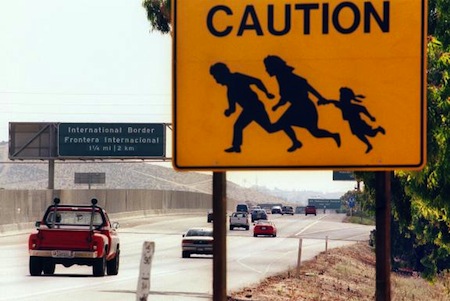The last time the United States seriously contemplated immigration reform, it was also immediately after the inauguration of a new Mexican president — Vicente Fox, a business-friendly conservative whose Partido Acción Nacional (PAN) came to power for the first time in 69 years, ousting the long-governing Partido Revolucionario Institucional (PRI).![]()
![]()
That was 12 years ago, and this time, the PRI has returned to Los Pinos with a new president — Enrique Peña Nieto.
While Peña Nieto’s administration moves forward with tax reform and business-friendly reforms of the Mexican labor and energy markets — all of which the PAN will likely support — his approach to pending U.S. immigration reform couldn’t be more different from Fox’s.
Fox came to office alongside U.S. president George W. Bush, and both had high hopes for U.S.-Mexican relations — after all, both were conservative reformers and former governors (Fox in Guanajuato in the industrial north of México and Bush in Texas along the Mexican border) with larger-than-life personalities and cowboy boots to match. So observers on both sides of the border believed their personal chemistry and simpatico views would actually bring about a new era in bilateral good feeling.
Fox’s major address before a joint session of the U.S. Congress, marking a turning point in Mexican-American relations, in fact, came on September 6, 2001.
What happened five days later would turn the Bush administration’s attention far from México, except for security concerns with respect to potential terrorists crossing into the United States, despite Fox’s vigorous and active campaign throughout the rest of his six-year term, and thereafter, for the United States to pass comprehensive immigration reform.
This time around, net migration from México has slowed from a burst of migration activity to net zero migration, according to Pew Research’s Hispanic Center, ending or even reversing a decades-long trend:
The U.S. today has more immigrants from México alone—12.0 million—than any other country in the world has from all countries of the world. Some 30% of all current U.S. immigrants were born in México. The next largest sending country—China (including Hong Kong and Taiwan)—accounts for just 5% of the nation’s current stock of about 40 million immigrants.
The relatively bleaker economic conditions over the past four years in the United States have much to do with the sharp decline, but there are other reasons, too — optimism over a Mexican economy that’s growing so rapidly that it is set to overtake Brazil’s economy as the largest in Latin America in the 2020s, and a half-century of declining Mexican birth rates.
Given that Fox’s approach fell flat, and in light of the relatively fewer gains for Mexican migrants north of the border a decade later, Peña Nieto’s approach has been decidedly less hands-on:
In a joint appearance, Peña Nieto told Obama that Mexicans “fully support” the idea of immigration reform but said, “More than demanding what you should do or shouldn’t do, we do want to tell you that we want to contribute. We really want to participate with you.”
Like his predecessor, the PAN-backed Felipe Calderón, Peña Nieto appears to be more interested in working with the United States on security matters, especially at a time when drug-related violence is on the decline in México, and at a crucial time for a new administration that hopes to bring a less confrontational approach to security, focused on reducing violence rather than declaring full-out war against Mexican drug cartels.
The release last week of a ‘bipartisan framework’ from a group of U.S. senators, however, makes U.S. reform more likely now than at any time during the Bush administration, meaning that the issue of immigration reform will necessarily take up more space on Peña Nieto’s agenda this year. Continue reading How U.S. immigration reform might affect México

